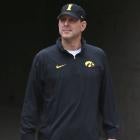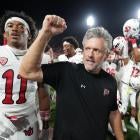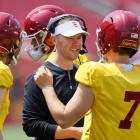NASHVILLE, Tenn. -- The American Football Coaches Association convention was once known for who and what wasn't there. That would be many high-profile coaches, and frankly, some credibility.
Three years ago in Indianapolis, the AFCA trotted out a former University of Texas cheerleader for her views on the growing concussion crisis.
Sandra Chapman, a cognitive neuroscientist, claimed damaged brains could be taught to heal themselves. "We pick up," she said then, "where basic medicine drops off."
Yikes!
The once sleepy, sometimes ineffective vocational association of 12,000 members has quickly turned itself around. It seems like we're going to have to pay attention.
That became obvious Wednesday when, at their annual AFCA meeting, FBS coaches recommended a mid-December early signing period in major-college football.
The proposal would make that December date the first of two signing periods -- the other being the traditional early February date.
What was once highly controversial now seems on the way to passage. There are miles to go. The Collegiate Commissioners Association controls the National Letter of Intent, and any legislation will have to be vetted by the CCA. Athletic directors and school presidents have to be convinced.
High school coaches with playoffs in December certainly don't want the distraction. But at least the game's most powerful coaches are on record. Previously, it was easier to herd cats than to get a sizable amount of FBS coaches to even attend this event.
"We have not in the past been engaged or coalesced behind an idea," AFCA executive director Todd Berry said.
The handsome, outgoing former coach with a .358 career winning percentage is leading this charge. Berry spent his first year on the job convincing coaches that an early signing period was in their best interest.
The approach was not unlike that of a Washington, D.C. lobbyist. Berry worked the phones, met coaches in person. The AFCA now has a platform, an agenda and some respect.
"What's come out of this convention is this group has decided to take ownership," Berry said. "We will back that up with our votes and make sure our voices are heard."
"The most important thing that Todd has done is reminded everybody this is important," Stanford coach David Shaw said. "This is the most head coaches we've had."
Approximately 100 (out of 128) coach attended the annual meeting. They adopted the early-signing measure unanimously.
"That group really stepped up today," Berry said. "This is the first time I had them as a group collectively. I'm proud of what was accomplished."
Nick Saban was among those who did not attend because of a conflict. Berry went out of his way to credit the Alabama coach. The two spent an hour on the phone Tuesday night talking about the proposals. Saban made it clear, Berry said, he was in favor of the early-signing period.
The measure has the possibility of doubling the usual signing day pressure and ratcheting up the manipulative and overwrought signing announcements. (Please, no more bulldog puppies, Isaiah Crowell.)
There is also the possibility an early signing period would relieve some of that pressure on prospects. High schoolers would still have the option of taking their time and signing in early February.
"Players still have the power," Shaw said. "The coaches don't have the power. If they don't want to sign that first signing day, they can sign that next signing day.
"We can try to pressure them, we can try to talk them into it, but it's up to them to decide."
Berry, 56, replaced the respected 83-year-old Grant Teaff as executive director in February. The former coach at Illinois State, Army and Louisiana-Monroe used both his business degree and recruiting skills to transform the association.
"I wanted it to have a business like atmosphere at the convention," Berry said. "Not just socialize.
Part of that transformation included the American Football Coaches Awards Show, which aired Tuesday night on CBS Sports Network. Jim Harbaugh flew in just to present an award.
"I feel a calling to it," Berry said. "This is what I envision happening."
The coaches had long since lost their voice on NCAA issues, mostly because they couldn't agree on much. Their lack of attendance at this event indicated some level of apathy. But thanks to Berry, this convention became too important to pass up.
"Many of them flew in just for this moment," Berry said of Wednesday's vote.
The early signing day proposal could become NCAA legislation by April.
It's impossible to understate how divisive even the concept of an early signing period has been. An early signing day was formally recommended by an entity last year. By June, the SEC had come out in strident opposition.
Now the major players seem to be aligned on a subject that has been cussed and discussed for more than a decade.
"There was some wind behind the sails," Berry said.





















